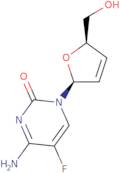Produktinformation
- 4-Amino-1-[(2S,5R)-2,5-dihydro-5-(hydroxymethyl)-2-furanyl]-5-fluoro-2(1H)-pyrimidinoneACH 126443L-Fd 4C
- 2(1H)-Pyrimidinone, 4-amino-1-[(2S,5R)-2,5-dihydro-5-(hydroxymethyl)-2-furanyl]-5-fluoro-
- 2(1H)-Pyrimidinone, 4-amino-1-[2,5-dihydro-5-(hydroxymethyl)-2-furanyl]-5-fluoro-, (2S-cis)-
- 4-Amino-1-[(2S,5R)-2,5-dihydro-5-(hydroxymethyl)-2-furanyl]-5-fluoro-2(1H)-pyrimidinone
- 4-amino-5-fluoro-1-[(2S,5R)-5-(hydroxymethyl)-2,5-dihydrofuran-2-yl]pyrimidin-2(1H)-one
- <span class="text-smallcaps">L</span>-Fd 4C
- Ach 126443
- Beta-<span class="text-smallcaps">L</span>-Fd4C
- L-Fd 4C
Elvucitabine is a nucleoside analog that inhibits the replication of HIV-1. It is active against HIV-1 isolates resistant to other antiviral drugs, such as zidovudine. Elvucitabine is a prodrug that is metabolized by liver enzymes to its active form, cytidine monophosphate (CMP). This drug has shown antiviral potency in vitro and in vivo against HIV-1. The pharmacokinetic properties of elvucitabine are similar to those of other nucleoside analogs, with an elimination rate of about 70%. This drug also has potential for use in treatment of hepatitis B and C. Elvucitabine has been shown to have biochemical research applications in cancer treatment and the study of growth factors.





